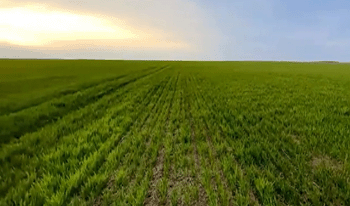05-04-2022 Chuck Holton
CAIRO, Egypt – Spring is in full bloom across Ukraine and the winter wheat will soon be ready for harvest. The Russian invasion, however, has everyone focused on mere survival, and the fighting will likely ensure much of this wheat never gets harvested. And the wheat stored in silos near Odesa can’t make it to market because of Russia’s blockade of ports on the Black Sea.
That bodes poorly for many countries that rely on Ukrainian wheat for survival. In Lebanon, it’s estimated the country will be out of grain in less than two months.
“The impact of the Ukraine war on Lebanon is going to be, unfortunately, multifaceted and we have seen that already, not only in the wheat supply that is coming into the country but even calls to our hot line for families looking for extra support,” said Ettie Higgins, the UNICEF acting representative in Lebanon. “Normally UNICEF supports 130,000 children every month with a small cash grant of 40 US dollars. And in recent weeks, the number of calls to our helpline has more than tripled as families have really struggled to put food on the table,” she added.
In Egypt more than 80 percent of the 270,000,000 loaves of bread the country consumes each day are made with wheat from Russia and Ukraine. So here, people see big problems on the horizon.
In Cairo, people on a fixed income are already feeling the pinch of high prices.
“The bread in Egypt is like the backbone because most of the people need bread to eat, and the price for the bread went up, so the place here like the bakery doesn’t make much more like before. He came to make less number of breads, so now like if you have to get ten pieces, you get just five,” Cairo resident Mohammad Hamza told CBN News.
“Two pieces, one pound. That is before the war between Russia and Ukraine, but after the war the bread came to be 70 percent more which is like 65-70 [Egyptian] pounds (about $3.50) per piece.”
Food security has always been extremely important in the desert of Egypt. Ruins of an ancient granary in Cairo that is said to have been built by Joseph in the Bible during the seven fat years they had before the seven lean years attests to a history of periodic famine. Joseph led the Egyptians to store up grain that they then sold to the entire ancient world. It’s believe the money gained from all that grain enabled the Egyptians to build some of the biggest monuments in the world, including the Great Pyramid.
But today Egypt is much less prepared for what looks to be lean years ahead. To counter this, Egyptian President Abdel Fatah el-Sisi has demanded the nation’s farmers dedicate a portion of their land to growing wheat. Those who fail to produce their quota face fines and possible jail time.
One Egyptian farmer told us threats aren’t necessary. “I’m happy to grow more wheat this year than last, because the prices are much higher. I’ve already sold all my winter crop and it will give my family a good life,” he said.
Any added grain grown by local farmers, though, won’t come close to making up the shortfall from Ukraine. For that reason, Egyptians are cutting back already, and blaming Vladimir Putin.
One Bedouin Herdsman said, “Yeah, the flour here gets really more expensive because of this crazy Russian government. He’s crazy!”
